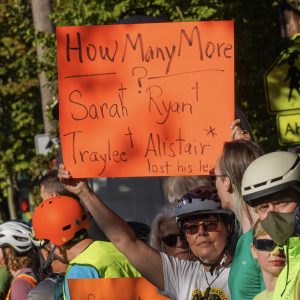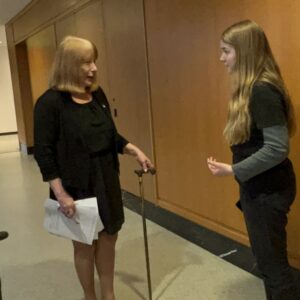
in the report is a 4% excise tax
on new bike sales that would fund
safety programs and more bike counters
throughout the city.
(Photo © J. Maus/BikePortland)
BikePortland has learned that the City Club of Portland will announce tomorrow that their membership has officially voted to support their research report on bicycling. No Turning Back: A City Club Report on Bicycle Transportation in Portland is an 83-page report that delves deeply into the bicycle issue in Portland and tackles everything from politics to projects and funding. The report was released on May 29th and some of City Club’s estimated 1,500 members voted on it in person at a “Friday Forum” event on June 7th.
However, this is the first report that City Club opened up to a new process of online voting. In February of this year, City Club’s Board of Governor’s voted to amend the organization’s bylaws to allow online voting as a way to increase the number of members who vote. Given that the report strongly endorses bicycling and calls on the city to do more to advance it, there was some nervousness among local advocates that the electronic vote might be close and/or even reject the research.
In addition to strongly supporting more bicycle infrastructure and bike-friendly transportation policies, the report’s authors also proposed a 4% statewide excise tax on new bicycle sales in order to fund safety programs and buy new bicycle counters. Not surprisingly, that specific proposal has dominated the media coverage and public dialogue around the report. The report also included a minority report penned by two of the 12-member bicycle research committee who felt the official proposals should include mandatory licensing of bicycle riders and registration of bicycles. Both of those measures were shot down by the majority and only the majority report was subject to the online vote.
So now it’s official: We find ourselves with one of Portland’s most respected and oldest civic institutions (it was founded in 1916) with a well-researched, officially adopted report that debunks many anti-bicycling myths and a position that bicycling is “an affordable and efficient means of transportation that is essential to continued growth in the local economy and overall quality of life for Portland residents.” Now the question is: Will citizen activists, advocacy groups, politicians and other powerful local decision-makers take the report and use it as leverage to push farther, faster? Or will it sit on a shelf next to all of Portland’s other big bicycling plans and reports?
— Read more coverage of the report from BikePortland News Editor Michael Andersen and check out the web version of all the report’s recommendations here.







Thanks for reading.
BikePortland has served this community with independent community journalism since 2005. We rely on subscriptions from readers like you to survive. Your financial support is vital in keeping this valuable resource alive and well.
Please subscribe today to strengthen and expand our work.
I want to thank everyone who helped build the “case for cycling” wiki that helped initially educate the committee.
Will this result in anything substantive in the near term? Or is this the same as the U.N. unanimously passing a non-binding resolution declaring starvation and disease as bad things but, offering no solutions or funding?
It already has. To have an org like City Club blast the false narratives and B.S. spewed by the local media and to come out firmly in support of reasonable policies that will help improve bicycling in Portland, they have already helped move the issue forward. Much of the reason cycling has stagnated in Portland is because of poor framing and communication by PBOT and others which has been compounded by unfair media coverage and a leadership vacuum. A respected institution that spent a year studying bicycling and found out that yes, indeed, it is awesome and it is a great solution for our city is important. But I agree with you that there’s a chance it doesn’t have the impact it could have. If it’s ignored from here on out by activists and politicians than it will have been a missed opportunity.
The report and the majority vote in support of it go a ways to demonstrate that biking as a viable option for transportation and traffic congestion relief, has the attention and interest of the City Club and people across Portland that hold the club members efforts with some high regard.
What near term results can be accomplished with this knowledge now acquired, depends upon ways people within and outside the club decide to use it. Use that interest and attention to direct more serious, broad sweeping consideration of, for our area…big concept infrastructure planning and construction such as cycle tracks.
Even though, the committee report seems to shy away from infrastructure projects that are difficult to do, with the interest and attention there, an opportunity to keep concentration focused on them ought not to be passed up.
Think we can get them to tackle the off-road cycling issue next?
City Club’s report on Forest Park delved into the issue of user conflicts in the park, but did not really attempt to work out solutions to all of those conlicts.
Who cares what City Club thinks? They lost all of their credibility when they hired Sam Adams.
Well, I guess that’s one way not to have to think about or engage in the issue. Tho I’ll admit the City Club may not be super up-to-date – maybe more of a young(ish) fogies outfit?
So, what . . . what . . umm . . . What??